At first glance, Disney’s Christopher Robin seems like another feel-good Disney fable:
The little boy who spent his childhood playing with Winnie the Pooh, Tigger, Eeyore, and Piglet in the Hundred Acre Wood is all grown up now, but adulthood has robbed him of life’s joy, so it’s up to Pooh and friends to remind him of what really matters.
The film’s trailer even telegraphs this theme:
But there’s a much more interesting message swimming under its surface.
The problem is, that more powerful (and empowering) message gets derailed by the film’s structure and tone, to the extent that I expect most people will miss it completely.
So, let’s look at what Christopher Robin is really saying about life’s problems and how to solve them.
WARNING: SPOILERS AHEAD for a movie whose lightweight plot is unnecessarily more important than it should be in a heartwarming movie about talking stuffed animals.
What Christopher Robin Says on the Surface
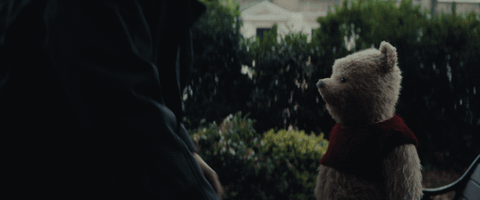
Here’s looking at you, kid.
As an adult, Christopher Robin (Ewan McGregor) has become a drudge.
His day job as the director of efficiency at Winslow Luggage, a postwar London luxury brand in the 1940s, is all dark wood, dimly-lit rooms, and dour faces. The brand is in trouble — it’s the least-profitable of all Winslow enterprises — and unless Christopher Robin can find a way to reduce costs by 20% in one weekend, most of his department will be fired.
The catch?
This is the weekend that Christopher Robin promised he’d take his long-suffering wife Evelyn (Hayley Atwell) and low-key genius daughter Madeline (Bronte Carmichael) away to his childhood cottage in Sussex for a weekend of playtime and relaxation. Now he has to cancel.
“It can’t be helped,” he tells Evelyn by way of explanation.
“It never can,” she replies, indicating that his loyalty to work over family is a recurring problem.
He insists that they should go on holiday without him, and he even offers to take his suitcase back upstairs so she won’t have to load it into the car… only to find it’s not there.
“I didn’t bother packing it,” Evelyn tells him, which sums up both his character and the reality of their crumbling relationship in one simple sentence.
You can already guess how the rest of the movie plays out.
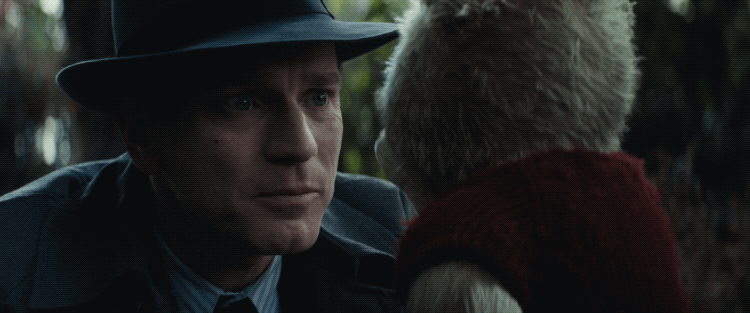
Hungry eyes.
A worn and faded Winnie the Pooh (voiced by Jim Cummings, who also voices Tigger) wakes up in a fog-shrouded Hundred Acre Wood. He can’t find any of his friends, so he goes looking for Christopher Robin, who was always able to find creative solutions to all their problems when he was a child. They duo are reunited in London and hilarity ensues.
All of which leads to the film’s climax, and the questionable delivery of its core theme.
RELATED POST:
The Unfortunate Lesson Storytellers Should Learn from Missing Link
What Christopher Robin Implies
At the film’s pivotal endpoint, Christopher Robin forsakes his job to rescue his daughter who’s “gone missing” en route to bringing him his Very Important Papers.
The good news is, Pooh and friends help the family come together again. The bad news? In the process, all of the papers with Christopher’s company-saving calculcations on them are lost.
How will Christopher Robin ever save the day now?
As luck would have it, only one of the papers remains… and as Christopher looks at it, he gets an idea… and that idea ends up saving the company.
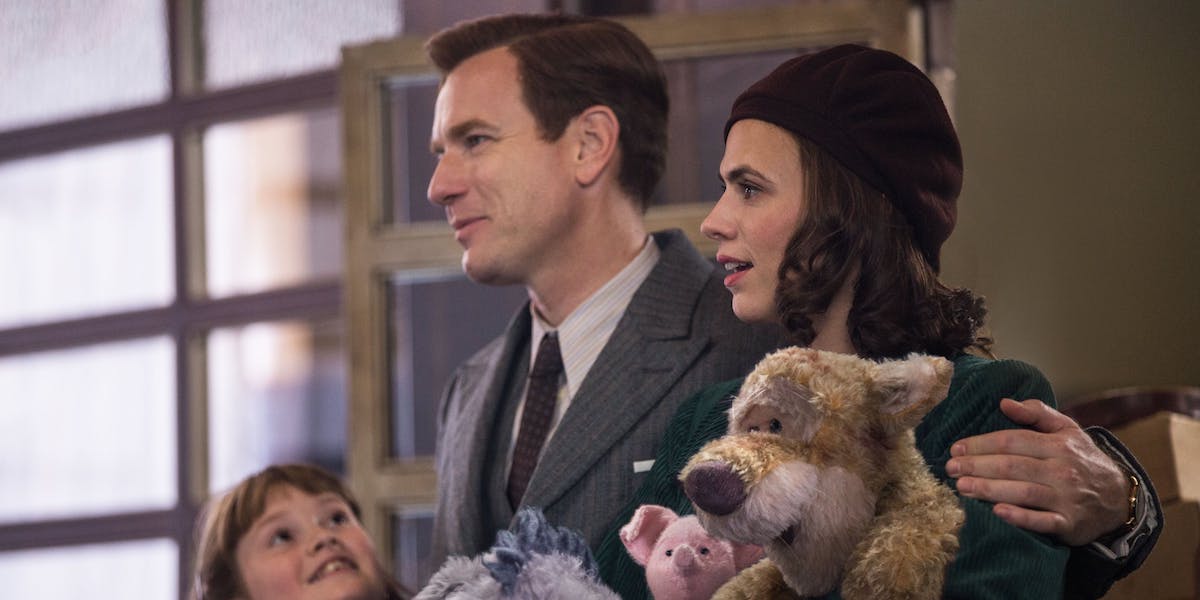
Family matters.
Christopher Robin storms back into the boardroom, family and toys in tow, and explains that what Winslow Luggage really needs is to give its employees paid vacations!
By giving the working class people of London some much-needed time off, they’ll actually have a need for luggage. And by lowering the prices of their luggage, Winslow can give those people the holidays they crave, the means to enjoy them, and generate the increased revenues the company needs to stay solvent.
Success! A capitalist problem is solved by exploiting the class system!
Er, wait… no, what I mean is…
By putting his family first, Christopher Robin gets the insight he needs to prove his worth to the firm, endears himself to his boss and his family at the same time, and rediscovers his inner child along the way. Hurray!
As a result, Christopher Robin serves as the audience’s feel-good reminder that family always matters far more than work does.
And sure, that’s exactly the family-friendly message you would expect from Disney, a company that makes billions of dollars a year by selling our own childhoods back to us at an ever-increasing markup.
Except this time, they’re wrong.
Or, more specifically, their most obvious message isn’t completely right.
Not when it’s compared to the message they’re burying.
What Christopher Robin REALLY Means
Let’s go back to the beginning of the film’s conflict.
The adult Christopher Robin is introduced to us a hyper-stressed efficiency manager who can’t appreciate innovation if it doesn’t also cut costs. He’s a joyless knob who cowtows to corporate pressure for the sake of pleasing everyone but himself.
He fails to realize that only supporting his wife and family financially doesn’t make up for his failure to also support them emotionally. (Which, to be fair, also serves as a meta-commentary on the fraught role of manhood in the 20th Century.)
His time spent helping Pooh find the other toys is seen as a costly distraction that robs him of his much-valued work time. Even when his wife and daughter accidentally find him in the middle of his Pooh-venture, he apologizes, tells them he has no time to explain, and leaves them to carry on without him.
Only in the end, when his daughter is missing and he’s forced to choose between work and family, does he finally make what the film would like us to believe is the “right” choice — family, obviously — and, by doing so, he learns the lesson he needed to learn in order to fix everything.
Seen that way, the film’s point is: keep your priorities straight and you’ll always have what you need to succeed.
But that’s really just half of the message.
What’s the missing half?
Stop creating your own problems.
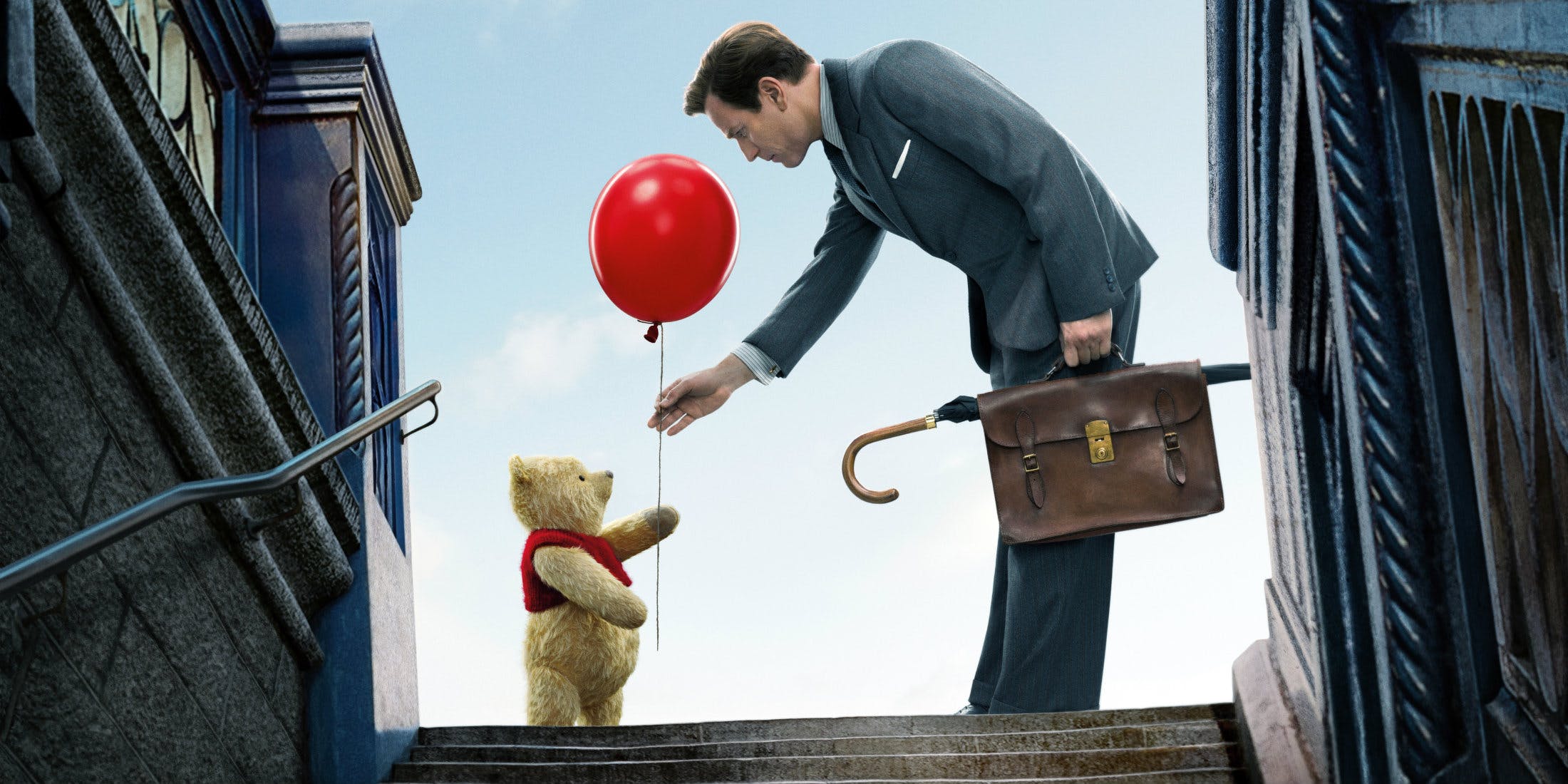
“WHERE ARE THE OTHER 99, POOH???”
Christopher Robin has a soul-sucking job because he chooses to stay there.
He has a frustrated wife and child who miss his youthful exuberance because he chooses to ignore that crucial part of himself.
Pooh wakes up in a dark and scary Hundred Acre Wood because, quite literally, Christopher Robin tells Pooh he left him behind and hasn’t thought of him in 30 years. Pooh is literally fading out of existence because Christopher Robin is forgetting him — and, in the process, he’s forgetting himself.
What’s empowering is how Christopher Robin finally solves all these problems:
He refuses to adhere to other people’s norms and invents his own.
He manages to find Eeyore, Tigger, and the others… but they’re suspicious and scared of him because he looks and acts like a joyless adult, not like the warm-hearted child they remember (again, a problem of his own making)… so he solves this problem by acting like the wild, brave, imaginative kid they all remember him to be.
Likewise, he doesn’t save Winslow Luggage by cutting corners and reducing headcount. He saves them by looking at a piece of paper upside-down — which he never would have thought to do intentionally — and getting inspired to see their entire problem from a new perspective.
That is exactly the outside-the-box thinking that saved the day on all his adventures with Pooh as a kid, and it’s the creative spark that’s been missing from his entire adult life.
Why The Film’s Deeper Message Gets Buried
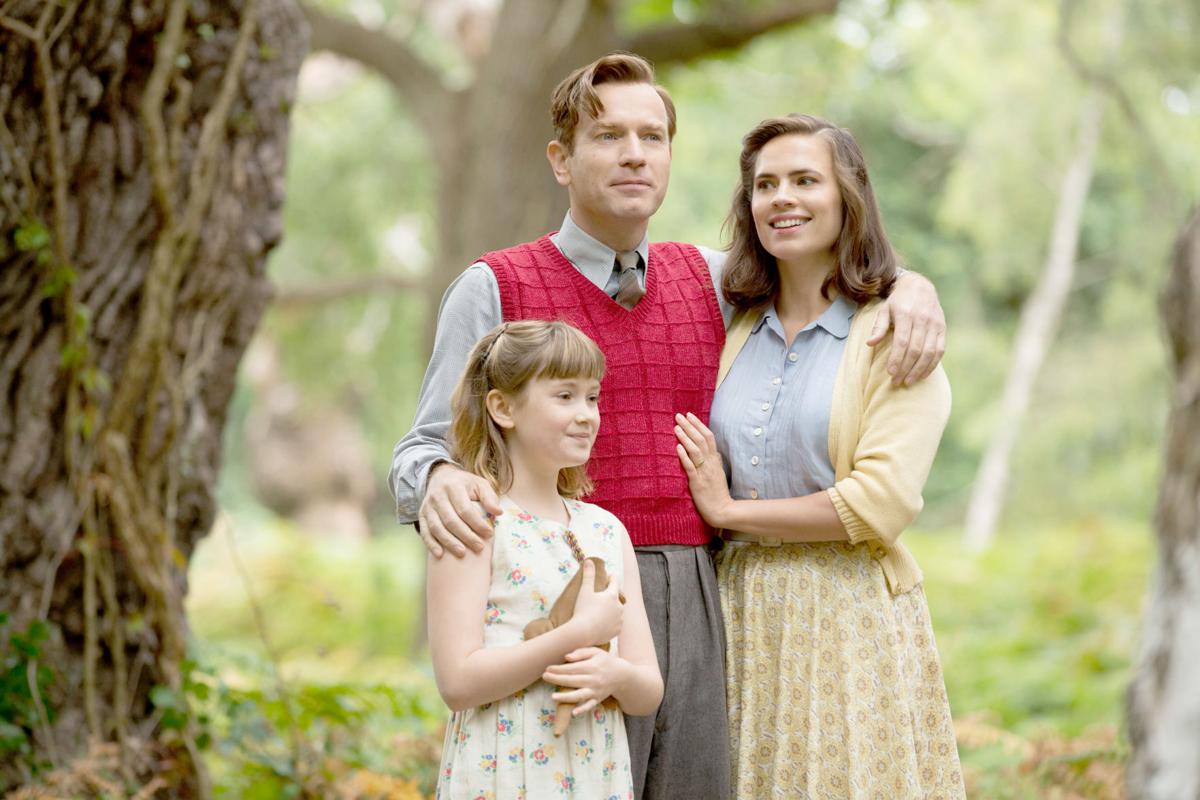
Holiday. Celebrate. / It could be so nice.
Christopher Robin looks like a cozy ode to family, but it’s actually a reminder that living creatively, originally, and even dangerously is what makes life worthwhile.
Once Christopher Robin comes up with his company-saving idea, he finds the courage to tell his boss off and the conviction to tell the company’s owner that his vision should be the company’s future. Because this is a Disney movie, they agree with him and he ends up the hero.
But even if he had been fired and laughed out of the boardroom, he still would have been the hero because he found his true self again.
And this, I think, is where the film buries the message of self-actualization beneath the safer message of family togetherness: it implies that A comes from B, instead of the reality that B is a result of A.
Just spending the weekend at the cottage wouldn’t have solved Christopher’s work problem. That only happens because everything else goes wrong and he ends up staring at a graph upside-down. Family may have been the mechanism that delivered that moment to him, but his ability to see mundane things in new ways is what actually saved the day.
Likewise, “spending more time with family on holiday” won’t save Christopher Robin’s marriage or the fortunes of Winslow Luggage; spending more time being creative and passionate will.
It’s ironic that a film where a man saves a luggage company by thinking outside the box insists that what really matters are in life are the boxes, rather than what you put into them.
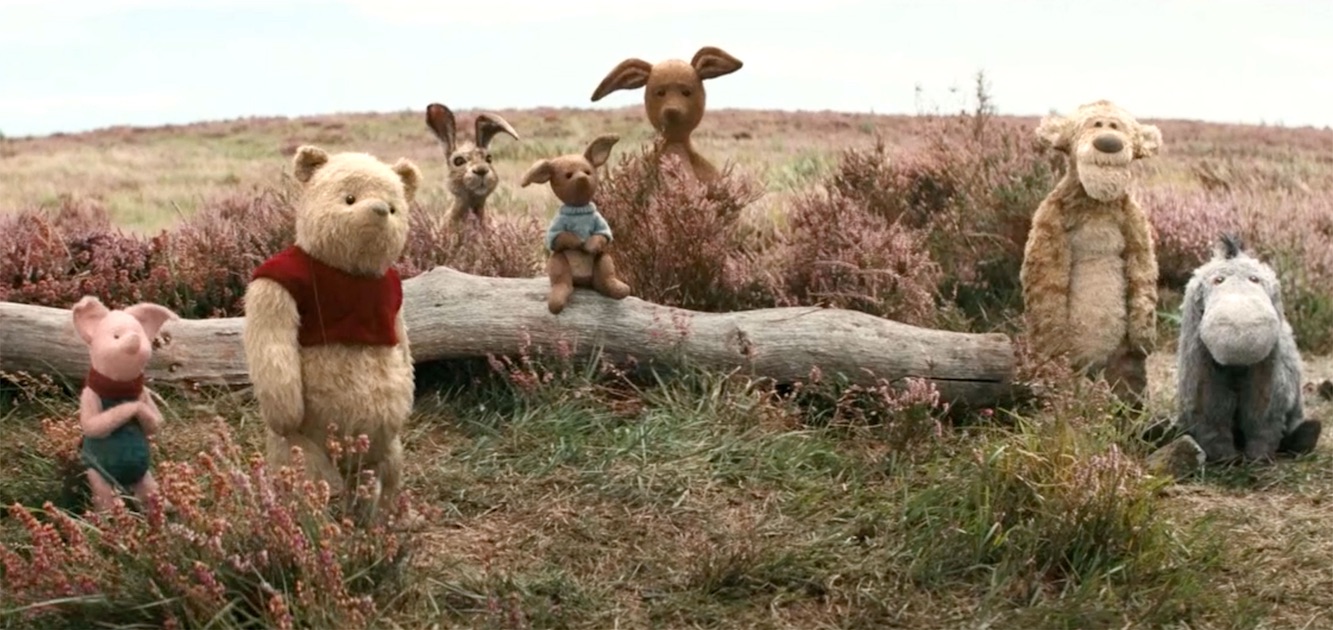
Don’t you / Forget about me… / I’ll be alone / Dancing, you know it baby…
Like This?
Share this post on Facebook or Twitter. (Sharing is caring, yo.)
Subscribe to my newsletter and you’ll never miss a new post. (I email it weekly-ish).
You may also like the surprising theme in Pixar’s Coco, or what the Mission: Impossible movies are really about.
Want More? See All My Top Storytelling Posts
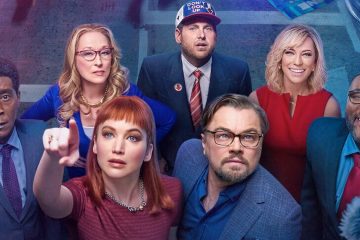

2 Comments
Jaime Benavides · January 21, 2021 at 12:31 am
Oh, I hadn’t watched this movie until today and I really loved it. I agree the core was reunite with your true self, which is the key to creativity.
I was thinking about the symbols and other elements in the film itself. I loved the way they used the fog to show Chris was getting consumed by his dull life. Then I thought he was able to find the other animals when he dared to see further inside his younger self, finding his true essence. This would explain why Madelain was able to see the animals right when she started playing–which, in her own words, was unknown to her until then. What troubles me is that I don’t quite understand why everyone else was able to see and hear the animals talk
Jocelyn George · April 2, 2020 at 8:43 am
Excellent and insightful review, Justin. It’s very well-written too. It was actually what you referred to as the “hidden message” of the movie that inspired me to buy the movie as a Christmas gift for my adult children. From my perspective, the movie reinforced the central message of my attempt at parenting, ie you are a unique individual, who you are really matters, so don’t forget yourself, don’t let life turn you into a worker bee. You were born a human being, don’t let life reduce you to a human doing. Anyway, I sure hope that’s the message my kids get from the movie. I hope it reminds them of what I tried to teach them when they were growing up.
Again, I appreciate your insight and your skill as a writer.